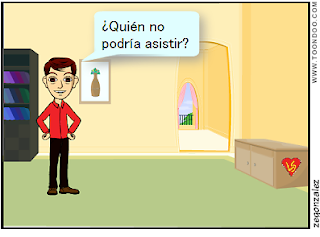Introduction
This
post is about verb conjugation -the conditional tense,
indicative mood of irregular verb poder.
SCENARIO
Imagine
you are taking to a relative, friend or colleague about an event due
to take place tomorrow afternoon. When speculating about changing it
to the morning, it transpires that, if you do so, some of the
invitees would not be able to attend. At that point the other person
says: "tell me, who would not be able to attend in the
morning?".
In
Spanish, the other person could choose to be less formal and say:
Dime,
¿quién no podría asistir por la mañana?
On the
other hand, he/ she could choose to be more formal and say:
Dígame,
¿quién no podría asistir por la mañana?
OUR
TIP
Making a sentence
which answers that question should be straightforward, but remember:
- Make sure that you conjugate your verb correctly
- Choose between formal or familiar options to suit the occasion -see examples below.
Typical answers
could be:
- Yo no podría* asistir por la mañana (I would not be able to attend in the morning);
- Tú podrías* asistir por la mañana, ¿no? (you -familiar would be able to attend in the morning, wouldn't you?);
- Usted podría* asistir por la mañana, ¿no? (you -formal would be able to attend in the morning, wouldn't you?);
- Pedro no podría* asistir por la mañana (Pedro would not be able to attend in the morning);
- María no podría* asistir por la mañana (Maria would not be able to attend in the morning);
- Mis amigos y yo no podríamos* asistir por la mañana (my friends and I would not be able to attend in the morning);
- Vosotros podríais* asistir por la mañana, ¿no? (you people -familiar/ plural would be able to attend in the morning, wouldn't you?);
- Ustedes podrían* asistir por la mañana, ¿no? (you people -formal/ plural would be able to attend in the morning, wouldn't you?);
- Pedro y María no podrían* asistir por la mañana (Pedro and María would not be able to attend in the morning);
Now you should
practise replying to someone who says to you:
Dime,
¿quién no podría asistir por la mañana?
*Please
see grammar topic below, Verbs
Verbs
A verb is a 'doing'
word which conveys:
- What action takes place in a sentence
- Who does that action
- When that action occurs.
In
addition, the verb may also convey the mood
or feelings of the speaker toward the action which takes place. The
verb may, for example, indicate whether the speaker is stating a
fact, expressing a wish or indeed giving an order.
Irregular
Verbs
Verb:
poder
The
Spanish verb poder is irregular* in some tenses, as
shown in the table below:
- TenseMoodRegularIrregularPresentIndicative✓ImperfectIndicative✓PreteriteIndicative✓FutureIndicative✓ConditionalIndicative✓PerfectIndicative✓PluperfectIndicative✓Future PerfectIndicative✓Conditional PerfectIndicative✓PresentSubjunctive✓ImperfectSubjunctive✓PerfectSubjunctive✓PluperfectSubjunctive✓
* NB:
- Conjugate tenses in the regular column the same as other regular verbs ending in -er
- The conditional tense conjugation/ indicative mood is shown below
Indicative
Mood/ Conditional Tense - Conjugation
Verb:
poder
- SubjectPODER(TO BE ABLE)
I YoPODRÍAYou TúPODRÍASYou Usted* PODRÍAHe Él She EllaWe NosotrosPODRÍAMOSYou Vosotros**PODRÍAISYou Ustedes***PODRÍANThey EllosThey Ellas
*NB
More courteous/ polite form of 'you'
**NB
'You' plural
***
NB More courteous/ polite form of 'you' plural
Verb
Conjugation Notes
It
is worth remembering once more that in its basic form (infinitive),
a Spanish verb is just a general 'doing' word. In that form, a verb
simply indicates an action and nothing else. If we want a verb to be
more specific about the action in a sentence, we need to conjugate
it. It is only when conjugated that the verb indicates:
- Who does the action
- When the action takes place
- The mood/ attitude of the speaker towards the action
The conjugation
tables above refer to using conjugation to establish who does
the action. What follows below are some notes on establishing when
the action takes place and the mood/ attitude of the speaker
towards the action.
Subjunctive
Mood
The
use of subjunctive
mood
is disappearing English. Nowadays is often viewed as an old and
unfashionable form of the language.
In contrast, the
use of subjunctive mood is very much alive and in everyday use
in Spanish. This widespread use of subjunctive mood tends to be the
bane of many a learner of Spanish from the English speaking world.
The
concept of subjunctive
mood
is perhaps best illustrated by contrasting its use against the use of
indicative mood with examples in English. The following are a couple
of examples which should serve that purpose:
- Indicative mood (“Peter eats an apple”).- Indicative mood is commonly used to make statements of facts or positive beliefs such as this one. As can be seen in the sample sentence (in quotes above), the speaker makes a clear and unambiguous statement of a fact (Peter eats an apple).
- Subjunctive mood (“Peter would eat an apple if he were hungry”).- In contrast with indicative mood, subjunctive mood is commonly used to make statements indicating hypothetical or non-fact actions. As can be seen in the sample sentence (in quotes), in this case the speaker sees the action of eating an apple as something hypothetical, something which may or may not happen (Peter would eat an apple... if he were hungry).
Verb
Tenses
Verb tenses relate
to setting the time period (when) during which the action of
the verb takes place. Basic times (periods) for Spanish verb actions
are:
- The past (before now)
- The present (now)
- The future (after now)
Each
Spanish verb tense corresponds to one of those basic time periods. In
other words choosing a verb tense places the action of the verb in
one of those basic periods and determines when
the action takes place.
Now
you should practise the use of the conditional tense of the
irregular verb poder with some examples of your
own.
Spanish
lessons online
Skype/
Google+ Hangout/ Facetime
Great
lessons
©
Copyright 2015 Love-Spanish.com
by Jose M González. All Rights Reserved.











